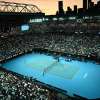
At training camps before the biggest fight, the talk is usually about the game plan, the weight cut and tactics. But in Islam Makhachev's camp there was also room for philosophical discussions. While the champion was preparing to defend his title at UFC 322, a heated argument broke out around him – not about wrestling, striking or even opponents, but about fiction and what role it should play in the life of a professional fighter.
When 'The Sicilian' Burst Into the Locker Room
Journalist and blogger Adam Zubayraev filmed the behind-the-scenes of Makhachev's preparation in New York for YouTube. The camera shows a shot fans are used to: Islam warming up with his team in the hotel gym before the fight with Jack Della Maddalena, Hasbulla nearby, jokes, a working atmosphere. And then the training content suddenly turns into a book club.
Umar Nurmagomedov, Khabib's first cousin, tells Islam about Mario Puzo's novel "The Sicilian" – the very book that is considered a continuation of "The Godfather". It is devoted to the fate of Salvatore Giuliano, a Sicilian separatist and partisan active in post-war Italy. Umar had said earlier that the novel made a strong impression on him: it has a struggle for independence, a conflict between the authorities and the people, and the drama of a man torn between ideas and reality.
It is at this moment that Khabib Nurmagomedov joins the conversation. Hearing that Islam has also picked up "The Sicilian", he immediately raises the issue: in his opinion, fighters should not be reading that kind of literature.
Books for Language vs Books for Purpose

The sides' positions are formed almost instantly. Umar and Islam stand on the same side: good literature, even fiction, broadens one's horizons, helps you speak better and formulate thoughts more clearly, and develops imagination. For a fighter who constantly appears in front of cameras and communicates with the media, this is, in their view, a very practical skill.
Khabib insists on a different approach. He recalls the religious tradition in which a believer asks the Almighty for protection from useless knowledge and transfers this concept to the modern era of information overload. Any information, he says, should bring you closer to a specific goal: to victory, to self-improvement, to spiritual growth. Everything that does not work toward that goal clutters the mind with unnecessary noise.
From his point of view, the story of the Sicilian mafia and separatists is exactly that kind of noise. "You live in Dagestan – why do you need books about Sicily?" is roughly how Khabib formulates his main thesis. If you dream of becoming a mafioso, that's one thing, but for a world-class athlete the priorities have to be different.
Football, the Yard and Brick Barbells: How 'Useless' Names Helped Him Become a Champion
Umar and Islam do not back down: they remind Khabib that a book is not only a plot, but also language, new meanings and the ability to see the world through other people's eyes. Islam jokes that the truly useless information is the dozens of footballers' names from the twentieth century that Khabib keeps in his head like a walking encyclopedia.
In response, Khabib turns the joke into a short monologue about his own formation. In his mind he goes back to the 1998 World Cup: Davor Suker, Ronaldo, Djorkaeff, Lilian Thuram, Bierhoff, Zidane – for him these are not just surnames, but symbols of a dream. As a boy from a village where barbells were assembled from bricks, he wanted to become a footballer but had no conditions. Instead of football, his path turned toward MMA, and the accumulated childhood energy and passion for sport spilled over into a fighter's career.
This is how Khabib shows that his "library" of names and matches is not empty nostalgia but the foundation of his motivation. The argument about books suddenly turns into a conversation about how childhood dreams can change the trajectory of a life.
Khabib's Information Diet

From the discussion of a specific novel, the debate shifts to a broader question – how in general to manage the flow of information that pours over a person every day. Khabib describes his system of filters: he is practically not subscribed to any channels, tries not to consume negative content and closely monitors what he allows himself to "let into his head".
He explains that a top-level fighter already has a very tight schedule: two training sessions a day, recovery, family, children, business projects. In such a rhythm it is very hard to squeeze in hours spent on a thick novel about distant Sicily. Not because reading is evil, but because time is limited and the goals are concrete. You do need to develop, Khabib admits, but you also need to set the right priorities and not turn reading into an escape from reality.
Abubakar Nurmagomedov sums up a temporary result with irony: people who grew up in the mountains herding livestock are now sitting in New York, passionately arguing about Sicily. In that phrase there is both a joke and a shade of respect for the path they have traveled.
Umar Between the Quran and the Avant-Garde: A Dagestani in Western Culture
Umar Nurmagomedov plays a special role in this argument. While Khabib often emphasizes religious grounding and strictness in choosing sources of knowledge, Umar demonstrates a more secular and exploratory approach to culture.
In his modest Telegram channel he combines religious quotes with photos from his travels: palm trees in Miami, the majestic palaces of Madrid, the canals of Venice. On his trips Umar eagerly visits museums and galleries – in Milan he was particularly struck by the works of European avant-gardists. He shares, for example, his impressions of Umberto Boccioni's "Riot in the Gallery" and of paintings in the style of René Magritte being sold by a street artist.
In this way the younger Nurmagomedov builds his own cultural bridge between the mountains of Dagestan and the art spaces of the West. For him, art is not only about aesthetics; it is also a way to understand how another world thinks without forgetting his own faith in the process.
What Champions Read: From School Classics to 'Atlas Shrugged'

Umar's passion for reading began back in school: he recalls working his way through "Gulliver's Travels", "The Three Musketeers", "The Lower Depths", "Dead Souls" and other classic texts. Later, the list was joined by novels you would hardly expect to find on the shelf of a lightweight contender.
Umar has said that he made it through "Atlas Shrugged", Ayn Rand's philosophical dystopian novel and one of the most voluminous works in world literature. Among his favorite books he also names "The Sicilian", "The Count of Monte Cristo" and Jack London's "Time Does Not Wait". Each of them, in its own way, tells a story about freedom, struggle, character and the price of personal choice – themes that are very close to the octagon.
He prefers to read on the road and at training camps: books always travel with him to America and Dubai. That is also where the book exchanges happen: Islam Makhachev, Usman Nurmagomedov and other teammates in camp share with one another whatever has hooked them. The result is a kind of private book club inside the UFC champion's team.
Khabib and Books: The Path to a Better Version of a Muslim
At the same time, you cannot say that Khabib ignores reading. On the contrary, he constantly talks about the importance of education and knowledge, but focuses on religious literature. Nurmagomedov says he has made serious progress in studying the lives of the prophets and that he has a teacher in Quranic studies. For him, a book is first and foremost a tool of spiritual work, a way to become closer to the ideal of a believer.
It is no coincidence that he places Rasul Gamzatov above Pushkin and Lermontov: for Khabib, the Dagestani poet is not only an author, but a symbol of an entire people, a man thanks to whom many learned about Dagestan beyond its borders. At the same time, Khabib admits that in recent years he has been reading less than he would like: his packed schedule eats up his time, and an inner sense keeps telling him that he needs to work on himself more.
When a Debate About Books Becomes a Conversation About Meaning

The story of "The Sicilian" in Makhachev's camp is not just a funny episode from a vlog. In this debate, different approaches to information, culture and self-development emerged within a single team. Umar and Islam see literature as a way to broaden horizons and speak the same language as the world. Khabib views books as a tool that should lead a person toward a specific, lofty goal and not distract from what matters most.
At the same time, all participants in the discussion agree on one thing: a world-class fighter cannot allow himself to be empty on the inside. Some fill themselves with religious texts, others with Western prose and art, others with childhood memories of football and the idols of the 90s. And perhaps it is precisely this mix of strict discipline, spiritual searching and curiosity about the world that makes Dagestani fighters so recognizable – not only in the octagon, but far beyond it.








